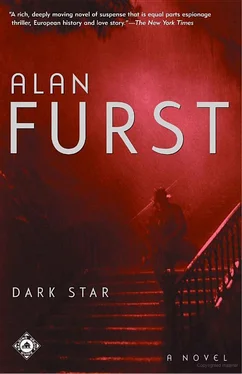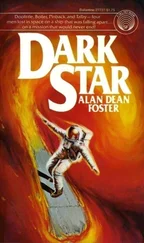Alan Furst - Dark Star
Здесь есть возможность читать онлайн «Alan Furst - Dark Star» весь текст электронной книги совершенно бесплатно (целиком полную версию без сокращений). В некоторых случаях можно слушать аудио, скачать через торрент в формате fb2 и присутствует краткое содержание. Жанр: Шпионский детектив, на английском языке. Описание произведения, (предисловие) а так же отзывы посетителей доступны на портале библиотеки ЛибКат.
- Название:Dark Star
- Автор:
- Жанр:
- Год:неизвестен
- ISBN:нет данных
- Рейтинг книги:3 / 5. Голосов: 1
-
Избранное:Добавить в избранное
- Отзывы:
-
Ваша оценка:
- 60
- 1
- 2
- 3
- 4
- 5
Dark Star: краткое содержание, описание и аннотация
Предлагаем к чтению аннотацию, описание, краткое содержание или предисловие (зависит от того, что написал сам автор книги «Dark Star»). Если вы не нашли необходимую информацию о книге — напишите в комментариях, мы постараемся отыскать её.
Dark Star — читать онлайн бесплатно полную книгу (весь текст) целиком
Ниже представлен текст книги, разбитый по страницам. Система сохранения места последней прочитанной страницы, позволяет с удобством читать онлайн бесплатно книгу «Dark Star», без необходимости каждый раз заново искать на чём Вы остановились. Поставьте закладку, и сможете в любой момент перейти на страницу, на которой закончили чтение.
Интервал:
Закладка:
Frau Baumann sat attentively silent during the discourse, her smile, in time, becoming a bit frozen- Julius, my dearest husband, how I love and honor you but how you do go on.
But Szara heard what she did not. He listened with great care and studied every gesture, every tone of voice. And a certain profile emerged, like secret writing when blank paper is treated with chemicals:
A courageous and independent man, a man of position and influence, and a patriot, suddenly finds himself bitterly opposed to his government in a time of political crisis; a man whose business, whatever it really was, has been officially designated a strategically necessary enterprise, who now declares himself, to a semiofficial individual of his nation’s avowed enemy, to be so isolated.
This added up to only one thing, Szara knew, and the rather dubious assignment telegram from Nezhenko began to make sense. What he’d written off as a manifestation of some new, hopelessly convoluted political line being pursued in Moscow now told another story. The moment of revelation would come, he was virtually certain, during his “grand tour” of the Baumann wire mill.
The dance of departure began at ten o’clock precisely, as Frau Baumann accepted with courteous despair the inevitability of Szara’s return to his lodgings and instructed her husband to walk Fraulein Haecht back to her family’s house. Ah but no-Szara fought back-Herr Doktor must in no way discommode himself, this was an obligation he insisted on assuming. What? No, it was unthinkable, they could not let him do that. Why not? Of course they must allow him to do that very thing. No, yes, no, yes, it went on while the girl sat quietly and stared at her knees as they fought over her. Szara finally prevailed-becoming emotional and Russian in the process. To dine so splendidly, then drive one’s host out into the night? Never! What he needed was a good long walk to punctuate the pleasure of the meal. This proved to be an unanswerable attack and carried the day. Arrangements to meet the following morning were duly made, and Szara and Fraulein Haecht were ceremoniously walked to the gate and waved out into the night.
The night made over into something very different.
Sometime after dusk the rain of the afternoon had turned to snow-soft, feathery stuff, nighttime snow, that floated down slowly from a low, windless sky. They were startled, it simply wasn’t the same city, they laughed in amazement. The snow crunched beneath their shoes, covered tree branches and rooftops and hedges, changed the streets into white meadows or into silvered crystal where street lamps broke the shadow. Suddenly the night was immensely silent, immensely private; the snow clung to their hair and made their breaths into mist, surrounded them, muffled the world, cleaned it, buried it.
He had no idea where she lived and she never suggested one street or another, so they simply wandered. Walking together made it easy to talk, easy to confide, easy to say whatever came to you, because the silence and the snow made careful words seem empty. In such a moment one couldn’t be hurt, the storm promised that among other things.
Some of what she said surprised him. For instance, she was not, as he’d thought, a cousin or a niece. She was the daughter of Baumann’s chief engineer and longtime friend. Szara had wondered why she’d remained in Germany but this was simply answered: she was not Jewish. Thus her father would, she explained, almost certainly become the Aryan owner of the business-new laws decreed that-but he had already arranged for Baumann’s interest to be secretly protected until such time as events restored them all to sanity. Was her father, then, a progressive? A man of the left? No, not at all. Simply a man of great decency. And her mother? Distant and dreamy, lived in her own world, who could blame her these days? She was Austrian, Catholic from the South Tyrol down near Italy; perhaps the family on that side had been, some time in the past, Italian. She looked, she thought, a little Italian. What did he think?
Yes, he thought so. That pleased her; she liked being so black-haired and olive-skinned in a nation that fancied itself frightfully Nordic and blond. She belonged to the Italian side of Germany, perhaps, where romance had more to do with Puccini than Wagner, where romance meant sentiment and delicacy, not fiery Valhalla. Such private thoughts-she hoped he didn’t mind her rambling.
No, no he didn’t.
She knew who he was, of course. When Frau Baumann had asked her to make a fourth for dinner she hadn’t let on, but she’d read some of his stories when they were translated into German. She very much wanted to meet the person who wrote those words, yet she’d been certain that she never would, that the dinner would be called off, that something would go wrong at the last minute. Generally she wasn’t lucky that way. It was people who didn’t care much who were lucky, she thought.
She was twenty-eight, though she knew she seemed younger. The Baumanns had known her as a little girl and for them she had never grown up, but she had, after all, one did. One wound up working for pfennigs helping the art director of a little magazine. Wretched things they printed now, but it was that or shut the doors. Not like him. Yes, she had a little envy, how he went the world over and wrote of the people he found and told their stories.
She took his hand-leather glove in leather glove down some deserted street where a crust of snow glittered on a wall. He wanted, now and then, to cry out that he was forty years old and scarred so badly he could not feel and that snow melted or changed back to rain, but of course he didn’t. He knew every bad thing about the Szaras of the world, their belted raincoats and reputations, and their need to plunder innocence in girls like this. For, twenty-eight or lying, she was innocent.
They walked endlessly, miles in the snow, and when he thought he recognized the name of a street near the house where he was staying, he told her. She looked at him for the first time in a long while, her face lit up by walking in the night, wisps of hair escaped from the dreadful bun, and took off her glove, so he took his off, and they froze in order to touch. She told him he mustn’t worry, her parents thought that she was staying with a girlfriend. Later they kissed, dry and cold, and he felt a taut back beneath the damp wool of her coat.
In his room, she was suddenly subdued, almost shy. Perhaps it was the room itself, he thought. Perhaps to her it seemed mean and anonymous, not the surroundings she would have imagined for him. Understanding, he smiled and shrugged- yes, it’s how my life is lived, I don’t apologize- hung up their coats, put the wet shoes by the hissing radiator. The room was dark, lit only by a small lamp, and they sat on the edge of the bed and talked in low voices and, in time, recaptured some part of the nameless grace they had discovered in the falling snow. He took her hands and said that their lives were different, very different. He’d be leaving Berlin almost immediately, was never in one place for very long, might not come back for a long time. Soon, even writing to someone in Germany might be difficult for somebody like him. It was a magic night, yes, he would never forget it, but they’d stolen it from a twilight world, and soon it would be dark. He meant … He would walk her home now. It might be better. She shook her head stubbornly, not meeting his eyes, and held his hands tightly. In the silence they could hear the snow falling outside. She said, “Is there a place I may undress?”
“Only down the hall.”
She nodded, let go of his hands, and walked a little way off from the bed. He turned away. He heard her undoing buttons, the sliding of wool over silk as she pulled her dress over her head, and silk on silk as she took off her slip. He heard her roll down her white stockings, the shift of weight from foot to foot, the sound of her unhooking her brassiere, the sound of her lowering her underpants and stepping out of them. Then he couldn’t keep his eyes away. She undid her hair and it hung loose about her face, crimped where she’d pinned it up. She was narrow-waisted, with pale, full breasts that rose and fell as she breathed, broad hips, and strong legs. Unconsciously, he sighed. She stood awkwardly in the center of the room, olive skin half-toned in the low light, the tilt of her head uncertain, almost challenging. Was she desirable?
Читать дальшеИнтервал:
Закладка:
Похожие книги на «Dark Star»
Представляем Вашему вниманию похожие книги на «Dark Star» списком для выбора. Мы отобрали схожую по названию и смыслу литературу в надежде предоставить читателям больше вариантов отыскать новые, интересные, ещё непрочитанные произведения.
Обсуждение, отзывы о книге «Dark Star» и просто собственные мнения читателей. Оставьте ваши комментарии, напишите, что Вы думаете о произведении, его смысле или главных героях. Укажите что конкретно понравилось, а что нет, и почему Вы так считаете.












